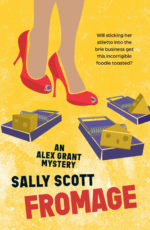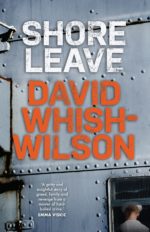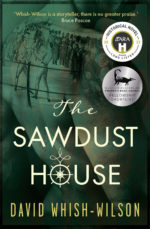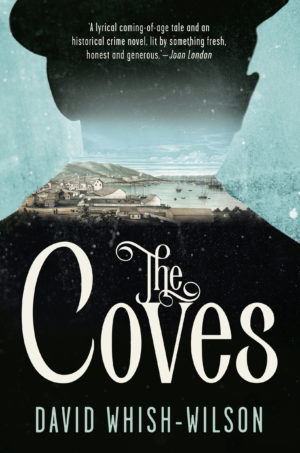When cheese turns deadly – crime writer David Whish-Wilson shares his thoughts on Fromage by Sally Scott
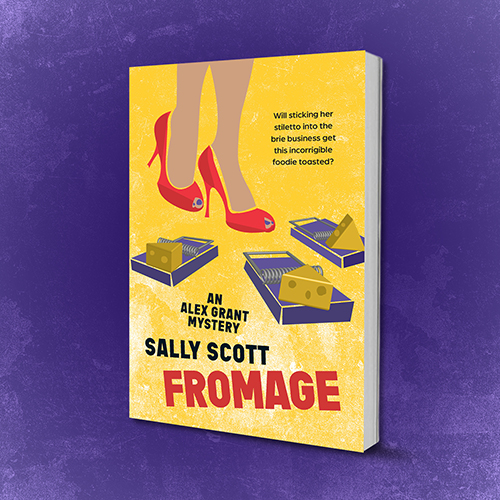
It was a day of sparkling wine, squishy cheese, good friends, family and fun when David Whish-Wilson launched Sally Scott’s debut cosy crime novel Fromage at Nikolai Estate in WA’s Swan Valley. Here’s what he has to say about the book.
As a crime writer, and lover of great writing more generally, Fromage was a real treat to devour, ‘scuse the terrible pun, or savour as the case may be.
Now, some people might not readily associate cheese and death – the kind of association made strongly in Fromage. In my family however, despite my great love of cheese, it’s something that we’ve lived with all our lives. The reason for this derives from the fact that my Dad grew up in remote rural Tasmania. My grandfather was a forestry worker, and while he was away working in the forests, the only other income for the family was the occasional sale of cream, from the dozen-odd dairy cows they kept on the property. If the local butter factory picked up the bucket of cream from the farm gate, they got some money that day, and so my dad and his nine brothers and sisters spent a lot of time milking cows and making cream.
In a cruel twist of fate, my dad is now extremely allergic to cheese. I never believed it as a kid, didn’t believe that being allergic to something so delicious was possible, until one day, I saw him eat a dip that he didn’t know contained cheese, and his throat closed up completely, and he couldn’t breathe – until my mother forced her fingers down his throat. It was very dramatic, and pretty disturbing, and so imagine us a few years later – me, my brother, and our father, travelling around France in a car for a couple of weeks. It was a great bonding experience, and my brother and I were in foodie heaven, gorging ourselves on food and wine day and night, but for my Dad it was like walking through a culinary minefield.
I’m aware that the former French President, Charles de Gaulle, once complained, ‘how am I supposed to govern a nation, that has 246 varieties of cheese?’ because of course, in France, cheese is everywhere, and in just about everything. As a result, for three meals a day, seven days a week, I had to ask poor waiters and waitresses in my atrocious French – ‘excuse moi monsieur, il y a fromage dans le [insert whatever was on the menu] parce que mon père, il est allergique au fromage.’ Which translated means basically as it sounds. The waiter of course would roll his eyes, thinking ‘stupid pain in the arse foreigners, how can you be allergic to cheese?’ and so, inevitably, I’d have to insist – ‘ecoutez moi monsieur, il est vraiment allergique. Quand il mange fromage, il mort!’ Which translated means something like ‘no listen mate, if he eat cheese, he die!’ The waiter would then take us seriously, but still, as that first spoonful of soup, or stew was raised slowly to my dad’s mouth, my brother and I would be watching, fearfully, ready to leap into action.
Which is another way of saying, that when I first heard of Sally’s novel, I wondered, did it contain murder by forced eating of cheese, or something else entirely? When Sally asked me come and help celebrate her book, I was also reminded of something the great Greek philosopher Epicurus said back in the day, and which I’d come across as an undergrad student, in a pretty boring book, but which I remember because it made me instantly hungry.
Epicurus is of course the philosopher you think of when you think about the pleasures of eating, and other simple pleasures, and to demonstrate his ideas on quality over quantity, he famously said at one point that ‘a single piece of good cheese is better than an entire feast’, which I think is true enough.
His three key secrets to a happy life were essentially friends, freedom, and a living the considered life. (I’m not so sure about the validity of the latter point.) He also said that we absolutely, definitely musn’t be afraid of death, which is true enough I suppose, unless you’re my father trying to eat in a French restaurant, or Sally’s journalist character in Fromage, Alex Grant, nosing about in a cheese laboratory in the Croatian mountains, following the brutal murder of a patriarch’s housekeepers, before returning to Australia, and continuing to investigate the same family, who everyone says is dodgy, as the bodies begin to pile up.
Now, I don’t know Sally very well, so I don’t know how much of Sally is in her central character, Alex, but either way, Alex is a terrific protagonist – funny, mischievous, curious-minded, a quick study of people and situations, and it’s this curiosity that draws the narrative along, as Alex finds herself in deeper and deeper water.
It’s her great love of cheese and wine, and her wit, that makes this a really distinctive story, in relation to the broader genre of cosy crime – she’s basically great company, and the novel contains plenty of laugh-out-loud moments.
Fromage is also, extremely well-written – with not a word out of place, and of course that’s something that’s vitally important when you want to describe the musty, gamey, gooey unctuousness of a good brie, for example, or the cold, buttery pleasures of a good chardonnay.
I’ve been pressing Fromage on plenty of people, and the feedback I’ve been getting is universally great. The English writer G.K. Chesterton may have once lamented, that ‘the poets have been mysteriously silent on the subject of cheese’, but perhaps no longer. I’d certainly recommend Fromage to anyone who hasn’t yet read the book – it’s the perfect book to give to someone who loves good writing, and good food of course, for a Christmas present – hint, hint. Those of us who’re readers will know that to Epicurus’s three wishes for a good life, you can also add – reading a bloody good book, which of course is what Fromage is.
I’d just like to share a very short passage, representative of Alex’s character, worldview and comic wisdom:
“In my view”, Alex says, “wine is the very best way to eat grapes. In their natural form, grapes were bits of flesh, hiding bitter seeds. As kids, my brother, Ben and I, had spitting competitions to see how high up the pool room wall, we might make them stick. As an adult, I considered the seeds to be a danger to my teeth, therefore, on dental grounds, it was best to consume them as wine.”
So, a toast – cheers to Sally, to all the world’s cheeses, and especially to Fromage.



